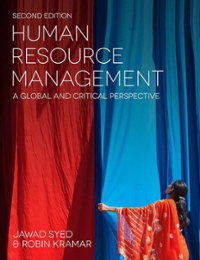So far, we have presented the view that ethics is an essential part of any critical treatment
Question:
So far, we have presented the view that ethics is an essential part of any critical treatment of management practice. We have also argued the case for a potential and legitimate ethics of human resources in action. Furthermore, underpinning our discussion is the assumption that ethics has an essence and can be defined, albeit in many ways. But, as students of HRM, you need to explore alternative viewpoints. Consider the following two quotes:
in its most visible manifestations, business ethics has become an exercise in proclamations: the publishing of admonitions, inducements, seductions. (Roberts, 2003: 250)
ethical behaviour takes place within a complex interaction of social forces and vested interests. Ethics as philosophical reflection is never enough but must interact with a realistic and accurate interpretation of social conditions and the prospects from their transformation. (Preston, 2014: 12)
The perspectives of Roberts (2003) and Preston (2014) provide us with some insight into the tension in any treatment of business ethics. In their engaging book, Jones et al. (2005) explore and discuss the 'charm of business ethics'. Drawing creatively on the writings of the French philosopher Bachelard, they argue that a definition of business ethics (and hence human resources ethics) is as elusive yet as charming as the notion of 'fire'. Following the reasoning of Bachelard, Jones et al. (2005: 70) argue that fire is difficult to treat objectively due to its seductive, almost hypnotic, charm and warming properties. In the same way, they argue, business ethics has its own particular charm, for after all, 'who could be against business ethics? Business ethics is a charming and attractive idea, seemingly irresistible to many' (Jones et al., 2005: 70).
The notion of Corporate Social Responsibility (CSR) also has its 'charmed' aspects. The idea of 'responsibility' goes beyond the requirements of the law, and as Jones et al. (2005) assert, is worthy of celebration. But when responsibility is codified, it is no longer an independent responsibility; it is no longer a moral choice. CSR is ofter treated as a strategic or marketing approach whereby customers are appeased by dealing with companies that market themselves as being 'ethical'. Whether or not firms are ethical in reality is not questioned. Under this approach; the prime concern of an organisation is conditional; the organisation wants to appear to be ethically responsible in order to secure market share. Another approach to CSR is the stakeholder approach, which is also a type of 'conditional responsibility'. Like the strategic approach to responsibility, it too is largely superficial. It 'is a responsibility that trades on the positive connotations of the word, but only loosely engages in anything that could be called responsibility in a stronger sense' (Jones et. al, 2005:123).
Charming? Business ethics and human resources ethics may well be charming, but we perhaps need to be aware of the potential piffalls of charming objects. They may hold us 'spellbound', thus preventing us from reflecting on their meaning and significance and possible dangers. In the case of business ethics and indeed human resources ethics, the critical distance can be thwarted by the entrancement and 'warmth' of the phenomenon itself.
We are thus drawn into arguments about the very meaning of ethics. As discussed above, most ethical frameworks tend to assume the meaning of ethics. Yet the meaning of ethics does not lie solely within the object; rather - and here is the contentious proposition - ethics relates to the subject who observes ethics. In short, as Jones et al. (2005: 73) simply state, 'People disagree about ethics'. In other words, the essence of ethics is mutable. This stance implies a non-essentialist approach to ethics.
Questions
1 In what ways might human resource management ethics be 'charming'?
2 What are some of the dangers of unreflective consideration of HRM ethics?
Step by Step Answer:

Human Resource Management A Global And Critical Perspective
ISBN: 9781137521620
2nd Edition
Authors: Jawad Syed, J; Kramar Syed, Robin Kramar





